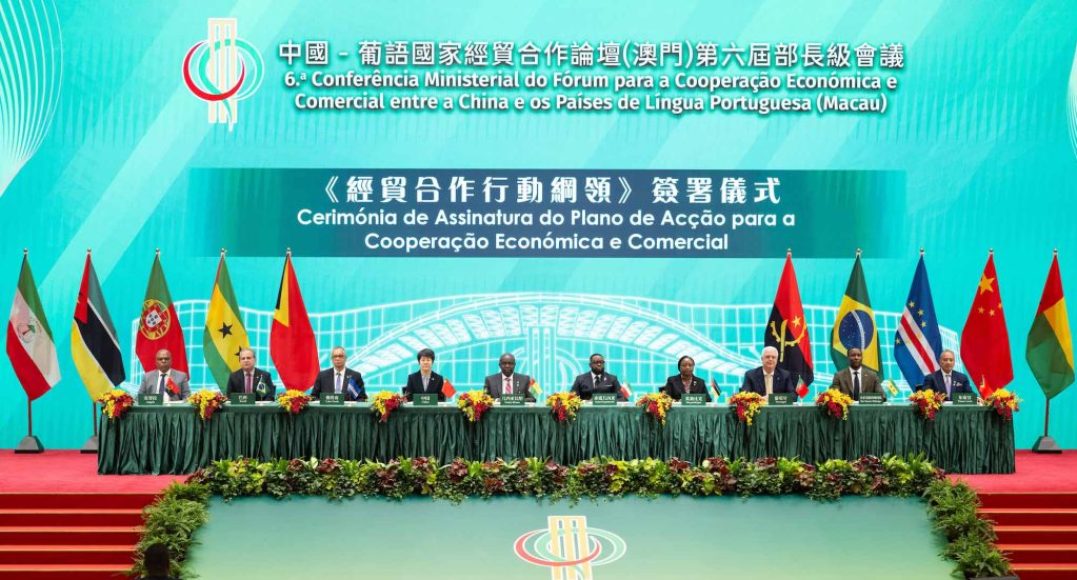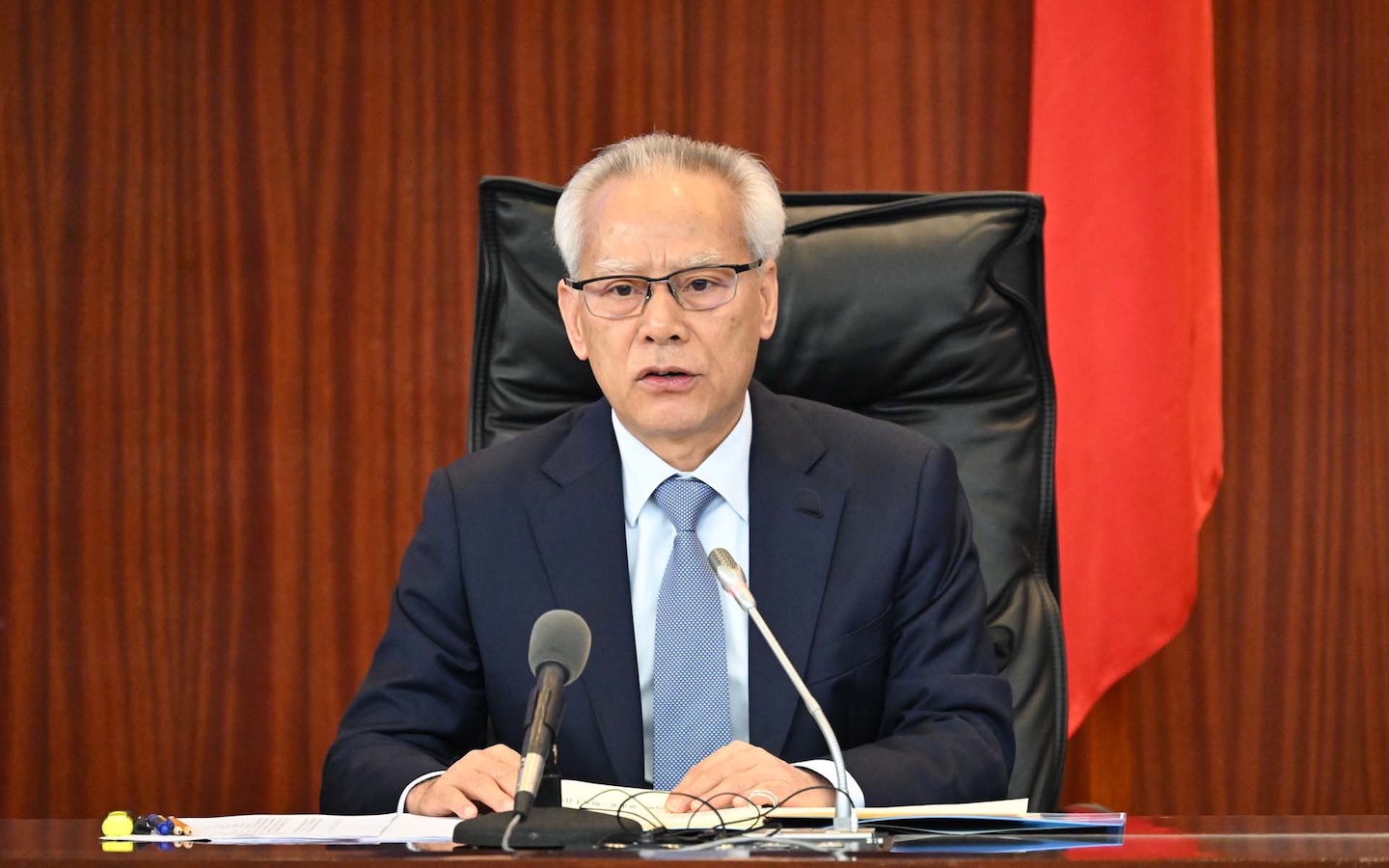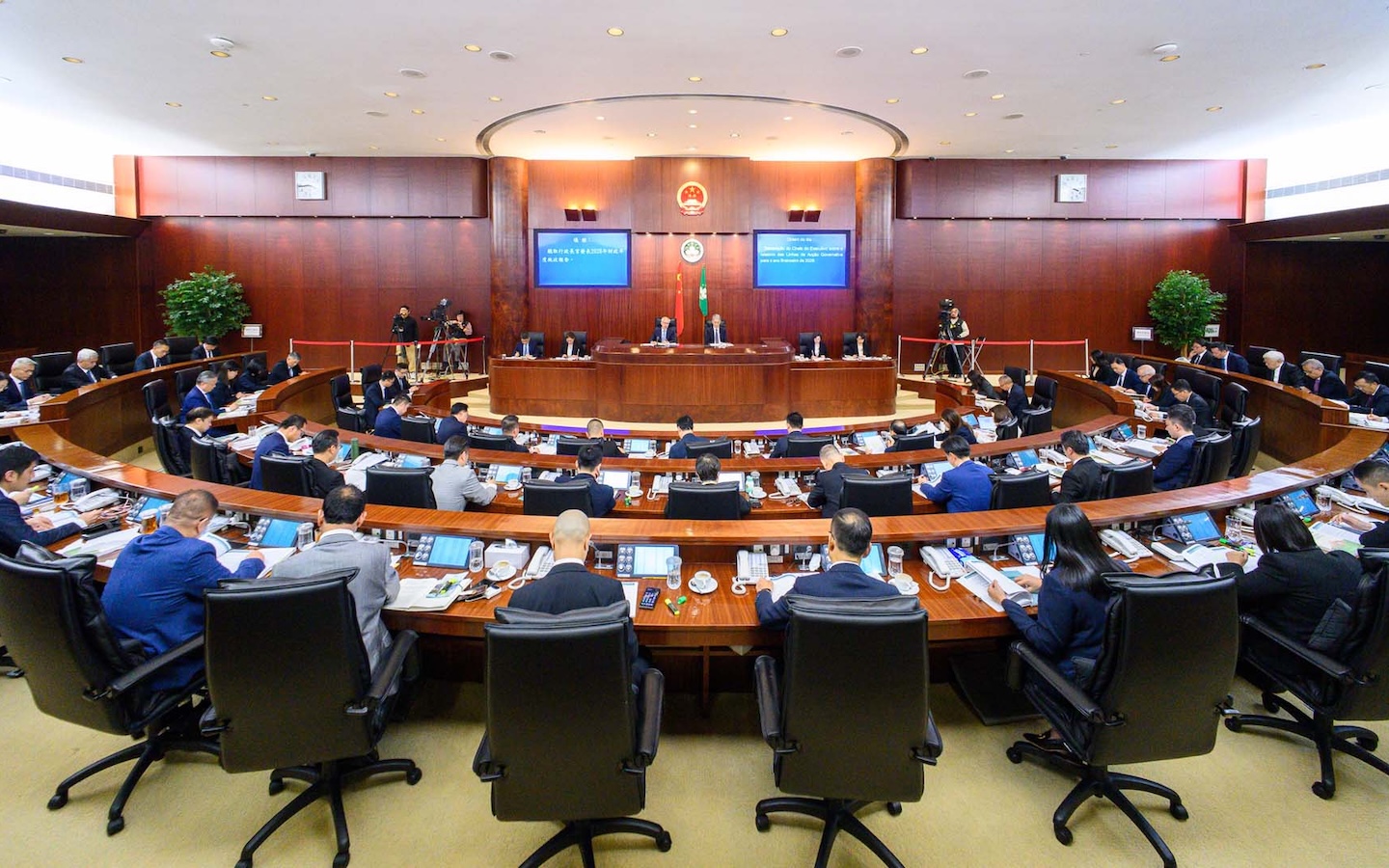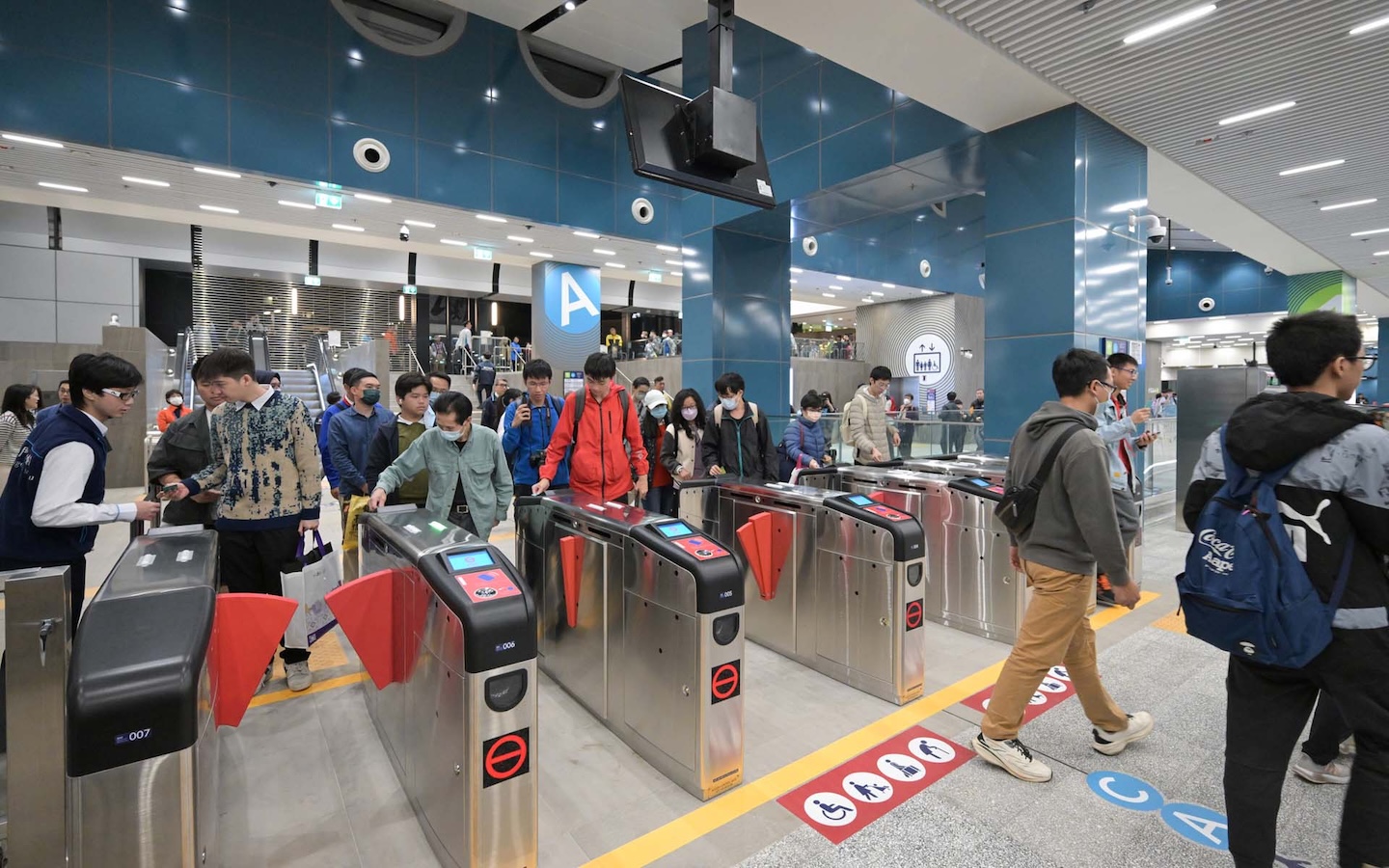The Forum for Economic and Trade Cooperation between China and Portuguese-speaking Countries (better known as Forum Macao) has become a model of partnership between countries with different social systems, cultural backgrounds, and developmental stages, according to one of China’s most senior officials.
Li Hongzhong spoke of the pivotal role Forum Macao had played in fostering both commercial and cultural ties among its members over the past two decades in his keynote speech at the forum’s 6th Ministerial Conference’s opening ceremony in April.
“Since its establishment [in 2003], trade between China and Portuguese-speaking countries has increased 20-fold, and China has become one of the most important economic and trade partners for Portuguese-speaking countries,” said Li, a member of the Political Bureau of the Central Committee of the Communist Party of China and vice-chairman of the Standing Committee of the National People’s Congress.
Li emphasised that progress and development, particularly with regard to environmental initiatives, were afoot. “New cooperation in addressing climate change, green development and the blue economy has emerged,” he said.
Six new measures designed to promote cooperation between China and Portuguese-speaking countries (PSCs) were included in Forum Macao’s new three-year action plan, which has been signed by all 10 member states. The measures range from improving cross-border financing and quarantine facilities to offering scholarships to able students from PSCs to study in China to providing medical aid to Asian and African PSCs. The national government has also pledged to deepen Macao’s role as the forum’s platform.
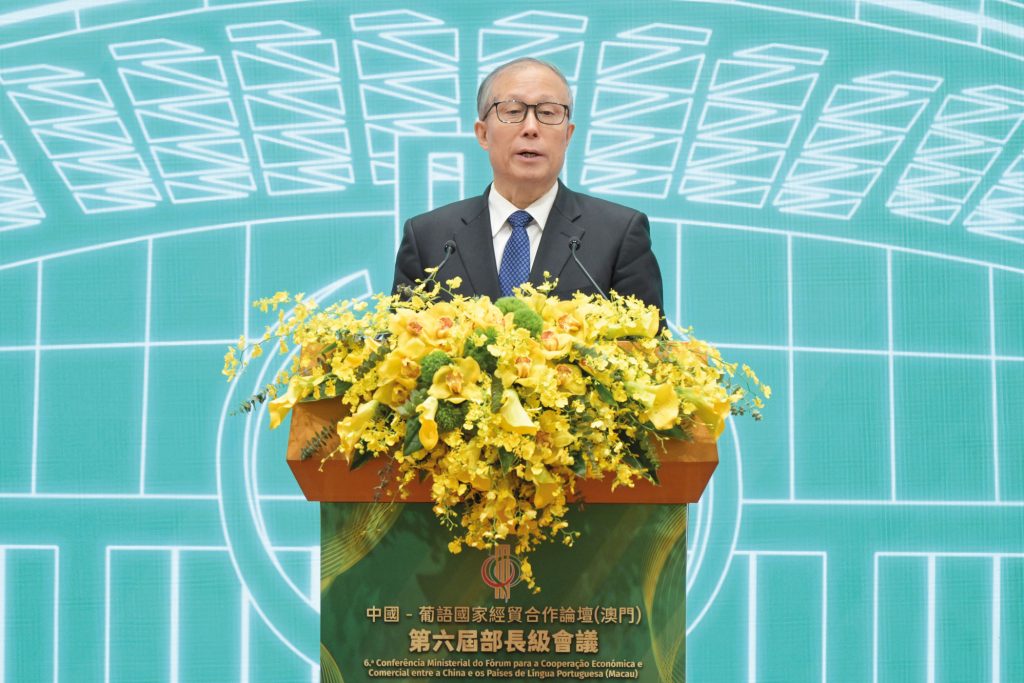
Li hailed the win-win results of cooperation and steadfast dedication to peace. At a time when the world was experiencing unprecedented changes, the vice-chairman assured those in attendance that China always followed through on its promises. He said that the country was willing to work alongside PSCs, “injecting more certainty and positive energy into global stability and prosperity.”
Senior officials from all 10 of the forum’s member states took part in the three-day conference, held at the China-Portuguese-speaking Countries Commercial and Trade Service Platform Complex, located near Macao’s Legislative Assembly building. Around 1,000 people attended in total, including director of the Macao Liaison Office, Zheng Xincong, and Foreign Ministry Commissioner Liu Xianfa. The conference focused on enhancing collaborative efforts between members, fostering mutual assistance and promoting a shared vision for humanity.
While the Ministerial Conference normally takes place every three years, the global Covid-19 pandemic and scheduling issues meant this was the first time representatives had met in person since 2016. Forum Macao’s member states are China along with Angola, Brazil, Cabo Verde, Guinea-Bissau, Equatorial Guinea, Mozambique, Portugal, São Tomé and Príncipe, and Timor-Leste.
At the opening ceremony, Chinese Minister of Commerce Wang Wentao commented on the enduring ties between members of Forum Macao. To illustrate, he quoted an ancient Chinese saying: “A partnership forged with the right approach defies geographical distance; it is thicker than glue and stronger than metal and stone.” The minister reiterated that there were many opportunities an ever-modernising China brought to the world, including to its fellow Forum Macao members.
Deepening Macao’s role as a Sino-Lusophone facilitator
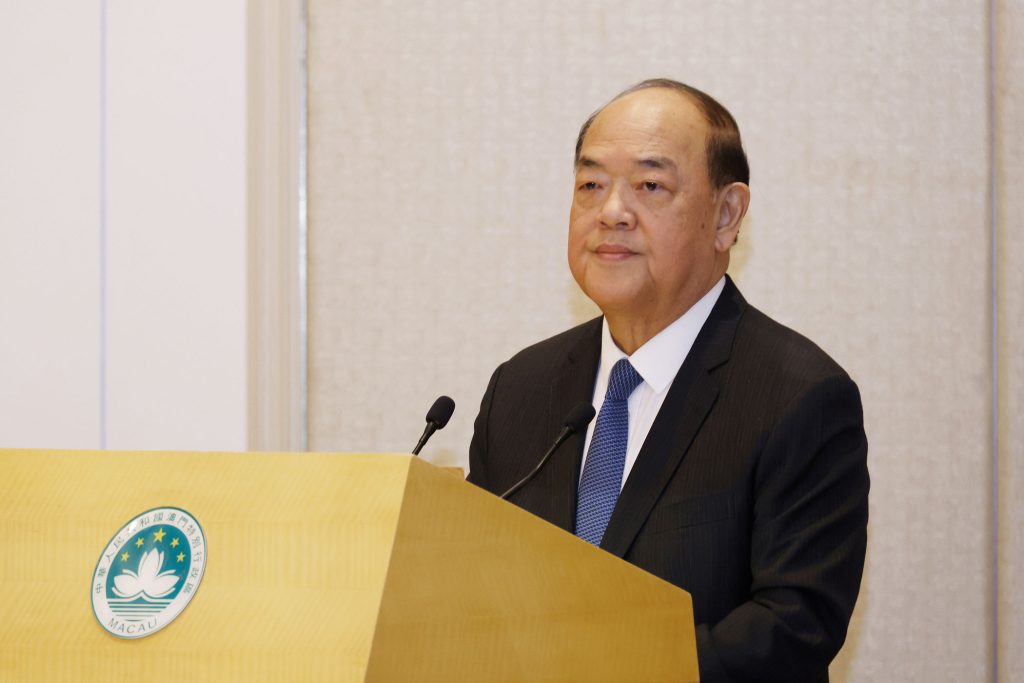
Wang also spoke positively of Macao’s performance as a platform between China and the PSCs. He said that the city, as a Special Administrative Region of China, had “fully leveraged the institutional advantages of ‘One Country, Two Systems’.”
And it appears that the city’s involvement in Sino-Lusophone affairs is poised to intensify: one of the six measures forum members signed during the Ministerial Conference was to “deepen Macao’s role” as the forum’s facilitator. The deepening would be achieved through developing an international bond market denominated in yuan and patacas and establishing a China-Portuguese-speaking countries’ science and technology cooperation platform in Macao, among other initiatives.
Macao Chief Executive Ho Iat Seng hosted a dinner for the conference participants during the three-day event. There, he promised that aside from the city’s role as a Sino-Lusophone facilitator, Macao would continue to participate in and support the development of the Belt and Road Initiative and promote the high-quality development of the Guangdong-Hong Kong-Macao Greater Bay Area and the Guangdong-Macao In-depth Cooperation Zone in Hengqin.
“At a time when the world economy is facing profound changes, solidarity, mutually beneficial cooperation and a joint response to challenges are even more important,” he said.
Ho also highlighted the “significance” of the 6th Ministerial Conference’s timing. This year is both the 25th anniversary of Macao’s return to the motherland, and the 75th anniversary of the founding of the People’s Republic of China.
Forum Macao receives praise and feedback from PSC members
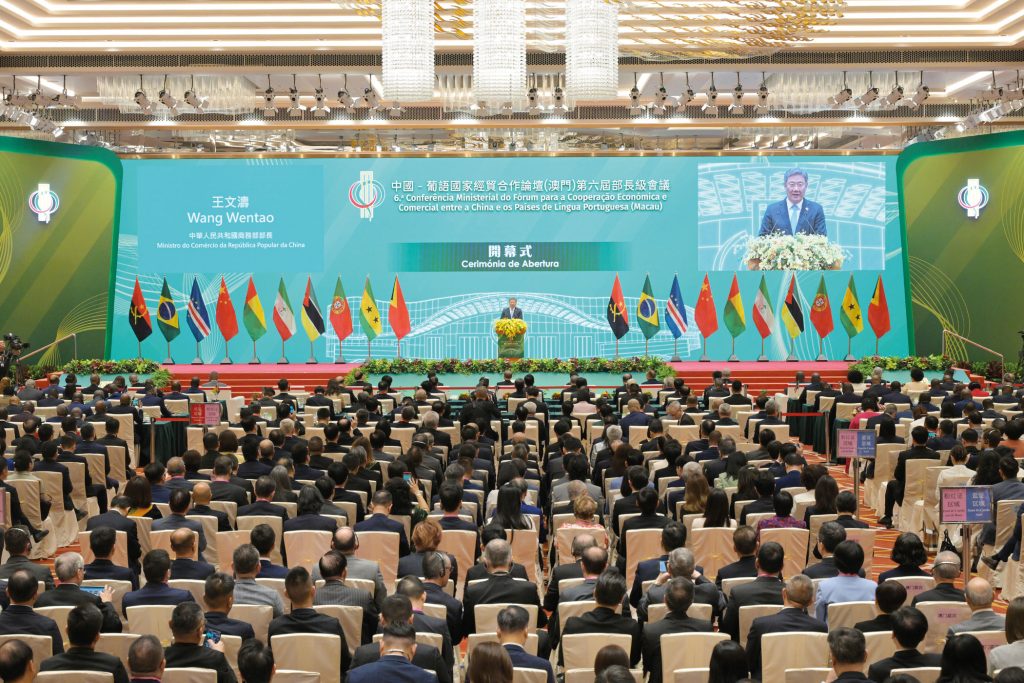
Each Portuguese-speaking country’s representative at the Ministerial Conference took the opportunity to offer feedback on Forum Macao usefulness as a platform for multilateral cooperation. Timorese Vice Prime Minister Francisco Kalbuadi Lay highlighted the “important role” the forum played in facilitating infrastructure projects between China and PSCs, for instance.
In addition, he noted its contributions to his tiny Southeast Asian nation’s food security, improvements in living conditions and sustainable coastal management. Lay is also Timor-Leste’s coordinating minister for economic affairs and minister of tourism and environment.
Portugal’s new minister of economy, Pedro Reis, hailed the “good understanding” held between China and his own country. He called for “joint reflection” on the forum’s existing financial mechanism (namely via its cooperation fund), saying Portugal believed there was room to intensify support measures for businesses in the PSCs – particularly small and medium-sized enterprises.
New Measures
Promote trade and investment, including through improving cross-border financing and quarantine facilities, supporting enterprises from PSCs to participate in the China International Import Expo (CIIE) and the compilation of a China-Portugal trade and investment guidebook.
Expand industrial cooperation. Have China assist PSCs to enhance their agricultural capabilities and enact more bilateral air transport agreements between Forum members, for example.
Strengthen development cooperation through the likes of implementing a series of small-scale yet impactful livelihood projects in Asian and African PSCs.
Promote human resources cooperation via training schemes and scholarships for PSC citizens in both China and Macao.
Advance medical and health cooperation. This will be in the form of increased cooperation with PSC hospitals, dispatching foreign aid to Asian and African Portuguese-speaking countries, and establishing Traditional Chinese Medicine (TCM) industries in certain PSCs.
Deepen Macao’s role as a platform through developing a financial services platform for China and PSCs and an international bond market denominated in yuan and patacas, as well as supporting the establishment of a China-PSC science and technology cooperation platform in Macao.
OPINION
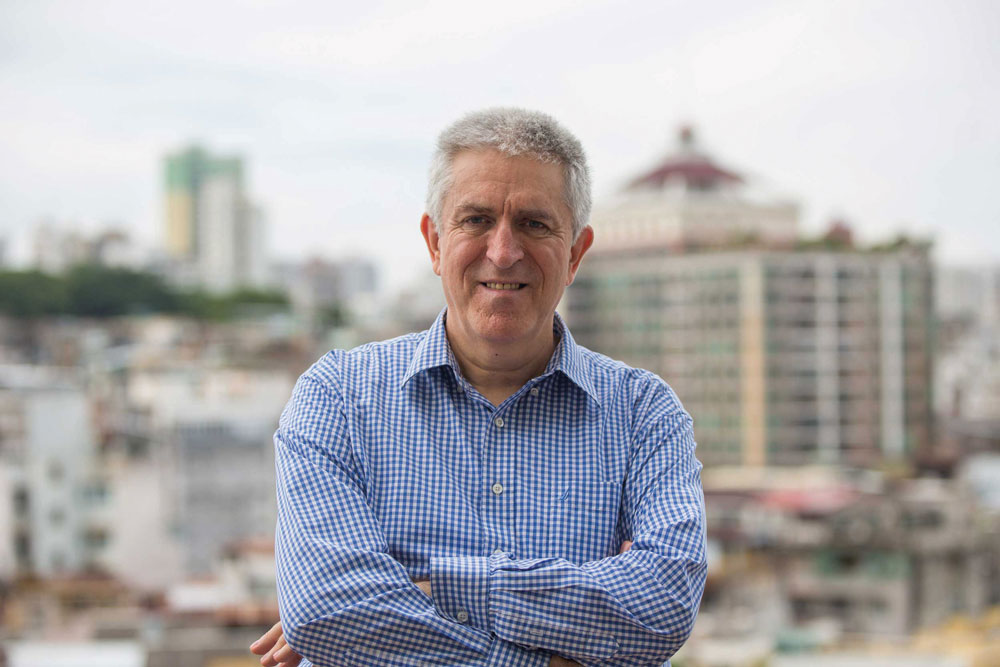
Mutuality, amity set Forum Macao apart Harald Brüning, director of Macau Post Daily
Forum Macao is, I am sure, one of the world’s most mutually beneficial and most amicable international entities. It is also a beacon of peace in the fragmented and troubled world’s increasingly violent rivalry.
Over two decades after its founding, Forum Macao includes all of the world’s nine countries that have Portuguese as their official language (or one of their official languages – Equatorial Guinea and Timor-Leste), with a total population of 290 million. Including China’s 1.4 billion inhabitants, Forum Macao represents about one-fifth of the world’s population.
The amazing thing is that an organisation representing such a huge number of people is headquartered in one of the world’s smallest territories by size (33.3 square kilometres) and population (around 680,000): Macao. Of course, Macao is one of the world’s oldest existing entrepôts – its history dates back to the mid-16th century – and a free port set up in the mid-19th century. The territory has the right historical background and constitutional framework to host Forum Macao.
One of the forum’s various outstanding features is that it comprises 10 countries that are able to maintain friendly economic, commercial and cultural ties even though their political systems are quite different and are ruled by parties that represent a wide range of political directions – socialist, social democratic, liberal, conservative, et cetera. However, unlike other international entities, Forum Macao does not intend to impose certain socio-political values on its members. It does not pursue the West’s purported approach of “shared values”.
Nine of the 10 Forum Macao are members of the emerging Global South, while Portugal is a country that is firmly anchored in the West, being one of the 12 founding members of NATO in 1949 and a member of the now 27-member supranational European Union.
Regarding political openness towards its membership, Forum Macao is similar to the intergovernmental organisation BRICS, which has now nine members (Brazil, Russia, India, China, South Africa, Iran, Egypt, Ethiopia and the United Arab Emirates). They also have rather different political systems but, notwithstanding the stark “otherness” as far as their respective methods of governance are concerned, have been able to form an intergovernmental organisation of emerging countries collectively defending their national and collective interests.
Forum Macao doesn’t, obviously, operate in a political vacuum. It is part of China’s Belt and Road Initiative, and, most importantly, President Xi Jinping’s proposals and actions concerning the creation of a Global Community of Share Future for Humanity. The forum is also, to a certain extent, the result of the famed Five Principles of Peaceful Coexistence marking their 70th anniversary this year.
Considering that six of Forum Macao’s 10 member states are from Africa, I think it’s appropriate to mention their continent’s philosophy of ubuntu (meaning ‘humanity’ in Bantu); a value system that stresses the interconnectedness of individuals with their respective societies and natural conditions. Ubuntu has also been translated as the African concept of ‘I am because we are’.
I think the concept stressing the existential importance of the human collective for each individual hits the nail on the head. Certainly, philosophy is a global phenomenon, and we can all benefit from each other and become friends through mutual respect – and learning from and with each other. I think that’s what Forum Macao has been doing for over two decades and will continue to do involving four of the world’s five (or seven) continents.
Creating wealth to benefit us all
It is now up to entrepreneurs from the participating countries to take up the mantle of wealth creators – for themselves and their respective countries. That’s what Forum Macao is all about: creating wealth benefitting all of us individually and, above all, collectively. Pursuing individual wealth without one’s fellow human beings in mind is counterproductive. Entrepreneurs need buyers to purchase their products and services, and buyers need to earn enough money to be able to make the purchases. It’s a two-way street.
Forum Macao needs the involvement of more entrepreneurs who, let’s be realistic, are more important for economic progress than merchants. While merchants buy and sell goods, entrepreneurs are proactive businesspeople developing new products and services and, consequently, taking major risks.
Forum Macao Secretary General Ji Xianzheng told local broadcaster TDM in April that the forum’s Cooperation Fund between China and Portuguese-speaking Countries had by then supported 10 projects worth almost US$500 million. The fund was set up in 2010 and activated in 2013. According to Ji, the forum has so far supported projects in Brazil, Mozambique, Portugal and Angola.
For Macao, the forum will continue to ensure its participation in international relations at a relatively high level, thereby promoting its international image as a service hub for economic, commercial and cultural contacts on the global stage – in the Portuguese-speaking world in particular. It’s also Macao’s contribution to assisting the nation in extending and reinforcing its global network pursuing mutually beneficial and amicable relations with a commercially and politically significant segment of the international community.
Win-win shall remain the ultimate aim of Forum Macao.
